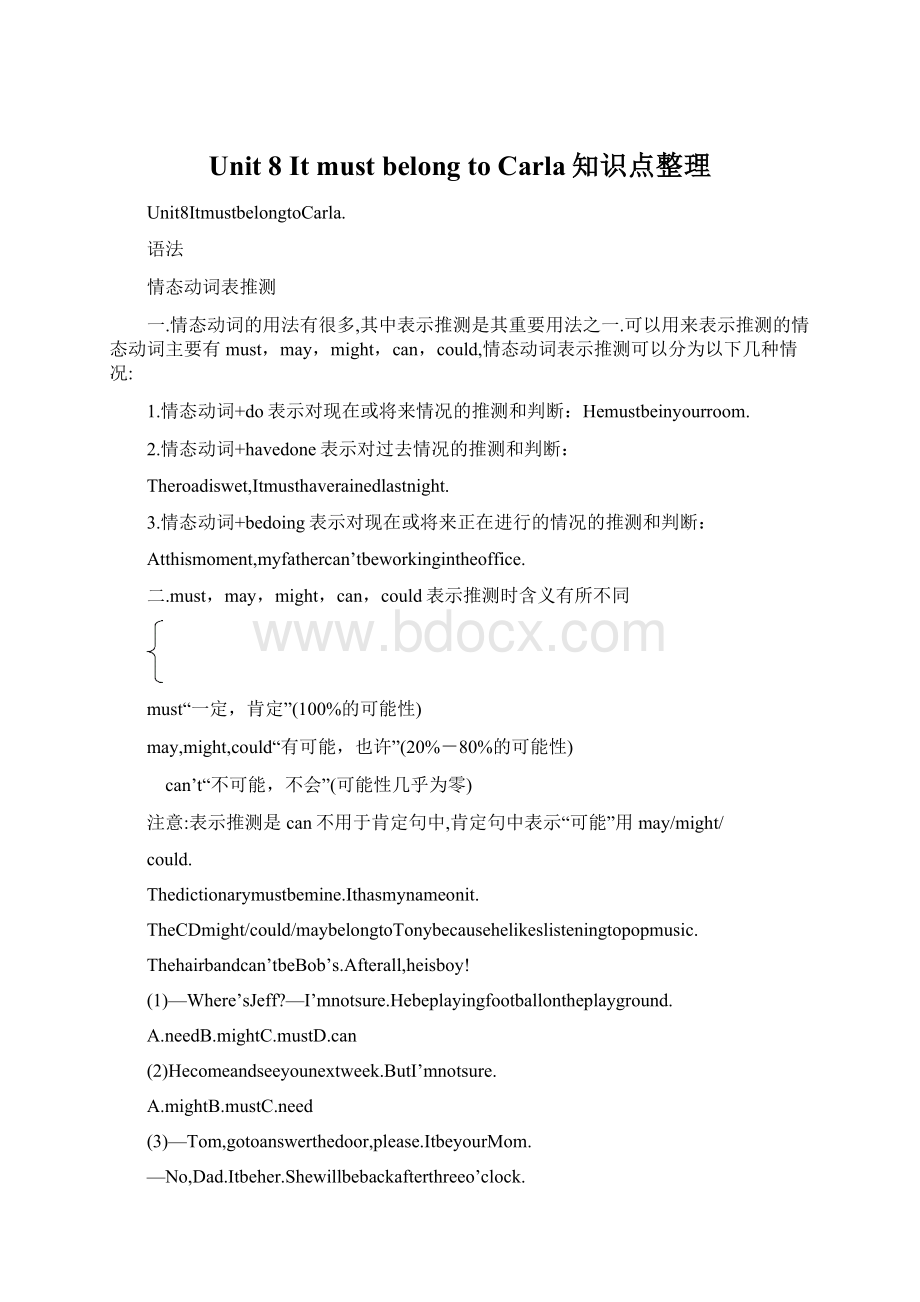Unit 8 It must belong to Carla知识点整理Word下载.docx
《Unit 8 It must belong to Carla知识点整理Word下载.docx》由会员分享,可在线阅读,更多相关《Unit 8 It must belong to Carla知识点整理Word下载.docx(11页珍藏版)》请在冰豆网上搜索。

mustn’t
(4)Henrybeathome,becausehephonedmefromBeijingjustnow.
A.mustn’tB.can’tC.must
(5)—WhereisJack,please?
—I’msure,hebeinthereadingroom.
A.canB.mightC.must
(6)TheshortgirlbeAlice.Sheisofmediumheight.
A.mustn’tB.can’tC.maynot
(7)—Whosebookisthis?
—It________beLusy’s.Hernameisonit.
A.couldB.can’tC.mustD.might
根据句意,用适当的情态动词填空
1.Sheknowtheanswer,butI’mnotsure.
2.LiMingbeinShanghai,becausehehasgonetoHangzhou.
3.Don’tplaywiththeknife.Youhurtyourself.
4.Ateacheralsomakeamistakeifheorsheisnotcarefulenough.
5.Oh,dear!
Youhavewalkedsolongonsuchahotday!
Youbetiredandthirsty.
6.—Whoisthemanoverthere?
IsitMrWang?
—No,itbehim.MrWanghascurlyhair.
7.Theysawsomethingintheskylastnight.ItaUFO.
8.YaoLeisaidhelate,buthecameontime.
SectionA
1.must的用法
(1)must表示推测时,意为“一定”,通常与be连用,只用于肯定句中。
Theremustbesomethingwrongwiththecomputer.
(2)must表示“必须”时,可用于肯定句、否定句或疑问句中;
用于否定句中时,mustn’t的意思是“一定不要,禁止”。
Youmustn’tplaysoccerinthesquare.
(3)以must开头的一般疑问句,肯定回答用must,否定回答用needn’t或don’thaveto。
—MustIgohomenow?
—Yes,youmust/No,youneedn’t/No,youdon’thaveto
(1)—MustIbeinhospitalforaweek,Doctor?
—No,you.Youcangobackhometomorrow.
A.mustn’tB.needn’tC.must
(2)Afteralongwalk,theoldmanbetirednow.
A.can’tB.mustC.hastoD.need
(3)It’sdangerous.Youplayfootballonthestreet.
A.can’tB.needn’tC.mustn’tD.maynot
2.goforpicnic“去野餐”atthepicnic“在野餐中”haveapicnic“进行野餐”
Wewenttothebeachforapicnic.
3.belongto意为“属于”,其主语通常是物.后接名词或代词宾格,不能接名词性物主代词或名词所有格。
Thisdictionarybelongstome=Thisdictionaryismine.
ThisdictionarybelongstoLiLei=ThisdictionaryisLiLei’s.
(1)ThenotebookmustLiHua.Ithashernameontheback.
A.belongB.beC.belongtoD.beto
(2)Whodoesthispencilcasebelong__________?
ItmustbeCelia’s.
A.toB.inC.onD.of
(3)DiayuIslandsChinaeversinceancienttimes.
A.belongtoB.belonginC.belongunderD.belongwith
4.What’sthematter?
“怎么了?
”这个句型常用来询问某人患了何种疾病或遇到了何种麻烦。
既可以询问人,也可以询问物。
后常接介词with。
=What’sthetrouble(withyou)?
=What’syourtrouble?
=What’swrong(withyou)?
=What’thematter(withyou)?
=Whathashappenedtoyou?
=what’sup?
=What’stheproblemwithyou?
What’sthematterwithyourcomputer?
(改为同义义)
What’syourcomputer?
5.Thereissomethingwrongwith……意为“……有一些毛病”
Thereissomethingwrongwithmystomach
6.
(1)join指参加某个组织;
加入某个群体,并成为其中的一员。
jointheEnglishclub加入英语俱乐部;
jointheParty入党;
joinsb意为“加入到某人当中”joinus加入我们,和我们在一起
(2)takepartin指参加体育运动或比赛。
takeanactivepartinsports.积极参加体育运动
(3)attend指参加会议,婚礼,葬礼,典礼,去上课,上学,听报告等。
He’llattendanimportantmeetingtomorrow.
Iattendedhiswedding.
ThetwinsaretalkingaboutthebookWhoMovedMyCheese.It’sfuntothem.
A.JoinB.joininC.takepartinD.enter
7.because意为“因为”,so意为“所以”。
并列连词so和从属连词because不能一起连用,同一句话中只能用其一。
Hewasilll,sohedidn’tgotoschool.=Hedidn’tgotoschoolbecausehewasill.
Therainwaslate,wehadtowaitforhalfanhour.
A.becauseB.orC.soD.but
8.
(1)valuable意为“值钱的;
贵重的;
有价值的”,常指物质金钱方面,强调贵重、珍贵。
bevaluablefor/tosb意为“对某人有价值”
Thisexperienceisvaluabletome.
(2)worth既指物质上的,也指精神上的,强调价值。
sthbeworthdoing.“某事值得做”Thebookiswellworthreading.
9.pickup“捡起”makeup“编造;
组成”lookup“查找,向上看”sendup“发射”
Thebooksareonthefloor.Pleasepickthemup.
Whenhesawawalletontheground,heatonce.
A.pickeditupB.gaveitupC.pickedupit.
10.“给某人打电话”的表达用语:
callsb=phonesb=ringsb
callsbup=ringsbupPleasecall/ringmeupwhenyougetthere.
givesbacall=givesbaring.
makeatelephonecalltosb.
11.在英语中,动词不定式可以表示目的,译为“为了”
Istayedtheretoseewhatwouldhappen.
TopasstheEnglishexam,IhavetostudyEnglishdayandnight.
Hehurriedbackhomehisschoolbag.
A.fetchedB.tofetchC.fetchingD.fetches
12.inordertodosth=soastodosth意为“为了做某事”
Inordertodogreatthings,wehavetoperfectthesmallthings.
Heranfastsoastocatchupwithme.
13.
(1)形容词修饰不定代词的语序是:
不定代词+形容词。
somethinginteresting一些有趣的东西somethingelse一些别的东西
(2)不定代词作主语时,谓语动词用三单形式。
(1)—Doctor,isthereanythingwrongwithmyeyes?
—No.EverythingOK.
A.isB.areC.amD.been
(2)MyhostfamilytriedtocookformewhenIstudiedinNewZealand.
A.differentsomethingB.differentanything
C.somethingdifferentD.anythingdifferent
14.除了no,not以外的其他否定词有never(从不),nothing(没有什么),few(几
乎没有),little(几乎没有),hardly(几乎不),seldom(不常,很少)而unhappy
(不高兴的),uncrowded(不拥挤的),dislike(不喜欢),unfriendly(不友好
的),unlucky(不幸运的),unimportant(不重要的),uncomfortable(不舒服的)等不
是否定词。
Shehasfewfriends,doesshe?
Yes,hedoes.
JimnevergoestothemoviesonSaturday,?
A.doesJimB.doesn’tJimC.doesn’theD.doeshe
15.区分voice,sound和noise
(1)voice一般指人的声音,如说话,唱歌,但有时也可指鸟叫的声音。
Thegirlhasabeautifulvoice.
(2)sound指人能听见的任何声音。
Soundtravelsmoreslowlythanlight.
(3)noise常指不悦耳、不和谐的嘈杂声。
Thenoisewakesmeup.
(1)Oh,mygod!
Thekidsaremakingtoomuchhere.Ican’tdoanything.
A.soundB.voiceC.noiseD.footstep
(2)Shehasaverybeautifulandsweet__________.
A.noiseB.soundC.voiceD.noisy
16.or的用法:
(1)or连词,意为“或者;
和”,用于否定句或疑问句中,肯定句中用and。
Doyouliketeaormilk?
(2)or还意为“否则”。
Getupearly,oryou’llbelateforschool.
(1)—Whichdoyouprefer,teacoffee?
—Tea,please.
A.butB.soC.orD.and
(2)Bequick,we’llbelateforthemeeting.
A.andB.butC.soD.or
17.
(1)too通常位于肯定句中,前用逗号隔开。
IhavebeentoParis,too.
(2)also位于实前系后。
HespeaksFrenchandhealsowritesit.
(3)either通常位于否定句中,前用逗号隔开。
Hedoesn’tlikeher.Idon’t,either.
(4)aswell通常位于肯定句末,前不用逗号隔开.IhavebeentoParisaswell.
Lucydidn’tfinishthehomework,.
A.eitherB.tooC.alsoD.neither
18.
(1)maybe是副词,用来表示推测,常位于句首。
Maybeheisright.
(2)maybe是情态动词+动词原形,意为“可能是”,在句中做谓语.
Hemayberight
(1)Sheknowtheanswer,butI’mnotsure.
A.maybeB.maybeC.mayD.must
(2)__________that’snotagoodidea.
AMaybeBMaybeCMayDBe
19.Therebesb.doing.“有人正在做某事”.Thereisacateatingfish.
Theremustbesomeonecryinginthenextroom.
—Thereisamanforyououtside,MrWang.
—Askinghimtocomein,please.
A.waitingB.towaitC.waitedD.waits
20.wishtodosth“希望做某事”Wewishtoliveinabighousewithabiggarden.
wishsbtodosth“希望某人做某事”Wewishourteachertojoinus.
21.
(1)hopetodo意为“希望做某事”不可用于hopesbtodosth.结构
IhopetogotoBeijing.
(2)hope+that从句,意为“希望……”
Wehopethatwecanseeyouagain.
—Ihopegotherewithus,JimandTom.—We’regladto
A.youtoB.youcanC.themtoD.theycan
22.havefun=haveagoodtime=enjoyoneself意为“做某事很开心”后面都接动词-ing形式。
(1)Wehadagoodtimeintheparkyesterdayafternoon.(同义句转换)
Weintheparkyesterdayafternoon.
(2)Trustme,andyou’llhavefun(play)thepiano.
23.
(1)hearsbdoingsth.意为“听见某人正在做某事”
IheardhimsingingwhenIwalkedpasttheshop.
(2)hearsbdosth意为“听见某人做过了某事或听见某人经常做某事”,指听见动作发生的全过程。
Ioftenhearhersingintheevening.
WhenIwaswalkingpasthisroomyesterdayevening,Iheardhimpiano.
A.playingB.toplaytheC.playingtheD.playedthe
24.nomatterwhen=whenever意为“无论什么时候”。
引导让步状语从句。
Youcanaskforhelpwheneveryouneedit.
Iamintrouble,mybestfriendLiLeialwayshelpsme.
A.WheneverB.WhateverC.HoweverD.Never.
25.sleepy“困倦的”asleep“睡着的”
I’mverysleepyandIwanttogotobed.Hehasfallenasleep.
Hefelt(sleep)andsoonfellasleep.
SectionB
1.exercise:
(1)作名词,当“锻炼、运动”讲是不可数名词。
常用短语为:
do/takeexercise意为“做运动”;
当“体操、练习题”讲是可数名词。
如:
domorningexercises做早操,doeyeexercises做眼保健操。
(2)exercise作为动词用时,意为“运动、锻炼”。
Doyouoftenexercise?
Theoldmanishealthybecauseheoften____.
A.exercisesB.drinksC.sleepsD.play
2.catch动词,意为“抓住,赶上”,其过去式、过去分词分别是caught,caught.
Thecatcaughtamouse.Hegotupearlytocatchtheearlybus.
Weusedtogetupearlyinordertotheearlybus.
A.bringB.missC.catchD.early
3.express动词,意为“表达”,通常不接双宾语。
expresssthtosb意为“向某人表达某事”。
Heexpressedhisthankstoher.
4.different是形容词,意为“不同的”,常用短语:
bedifferentfrom“与……不同”Thisbookisdifferentfromthatone.
difference为可数名词,意为“差别,不同之处”。
thedifferencebetween……and……“……和……之间的差别”
TherearesomedifferencesbetweenLucyandLily.
5.thesame…as意为“和……一样”,其反义词组是bedifferentfrom“和……不同”注意same前必须加the.Shewearsthesameskirtashersister.
(1)Thefoodmycountryisquitedifferentthathere.
A.in;
likeB.to;
fromC.from;
toD.in;
from
(2)Isherwatch_______yoursordifferent?
A.thesameB.thesameasC.sameasD.thesameto
6.information是不可数名词,意为“信息”。
Ihavesomeinformationabouttheexam.
JustsearchtheInternet,andyoucangetalmostalltheyouread.
A.informationsB.informationC.pictureD.story
7.as可以意为“因为;
当……的时候;
作为”
Asitwaslate,Iwentatonce.
Asastudent,weshouldstudyhard.
Heshoutedaloudasheranalong.(强调的是不同动作同时发生)
municatewithsb意为“与某人交流”
Hehadnowaytocommunicatewithhiselderbrother.
9.在英语中,有三个词可以表示“到达”,但用法不同
(1)arrive是不及物动词,后面需接介词at或in,再和表示地点的名词连
用.arriveat常跟一个较小的地方;
arrivein常跟一个较大的地方.
Hearrivedatthevillageat7:
30.
IwillarriveinBeijingtomorrow.
(2)reach是及物动词,后面直接跟宾语
IwillringyouassoonasIreachBeijing.我一到北京就给你打电话
(3)get是不及物动词,后面需加介词to,再跟表示地点的名词.
PleasewritetouswhenyougettoBeijing.
get和arrive后跟表地点的副词时,则不需接介词.
Myfatheroftengetshomeearly.我父亲经常回家早.
10.
(1)pointto“指向”指向离说话人较远的人或事物。
(2)pointat“指着”,指向离说话人较近的人或事物。
(3)pointout“指出”,给某人指出方向、要点或错误等。
Willyoupleasepointoutthemanwhosavedtheboy’slife?
Don’tpointatthewordswhileyouarereading.
Hepointtothehouseontheothersideoftheriverandsaid,“That’smyhome.”
11.alittle=abit=alittlebit=kindof意为“一点儿;
少许”都可以用来修饰形容词/副词。
alittlebitquiet.此外,alittle还可以直接修饰不可数名词,而abit须和of连用才可以修饰不可数名词。
Theweatherhereisalittlebithot.alittlewater=abitofwater一点儿水
—Whatisyournewfriendlike?
—Sheisshy..
A.abitofB.alotofC.alittlebitD.akindof
12.allkindsof意为“各种各样的”differentkindsof“不同各类的”
Wehaveallkindsofwaystofinishthejob.
Therearedifferentkindsofbooksinabookstore.
13.purpose名词,意为“目的,意图”,thepurposeof……意为“……的目的”。
onpurpose“故意(地),有意(地)”
Thepurposeofthemeetingistoelectanewmonitor.
14.medical形容词,意为